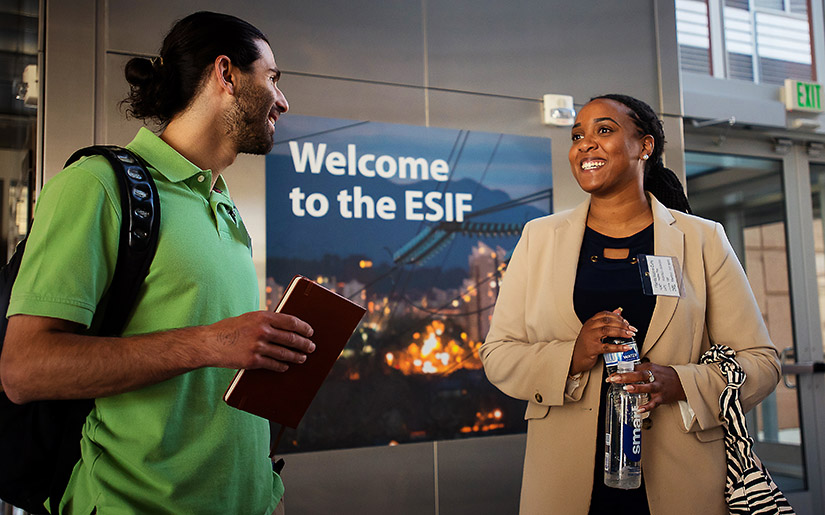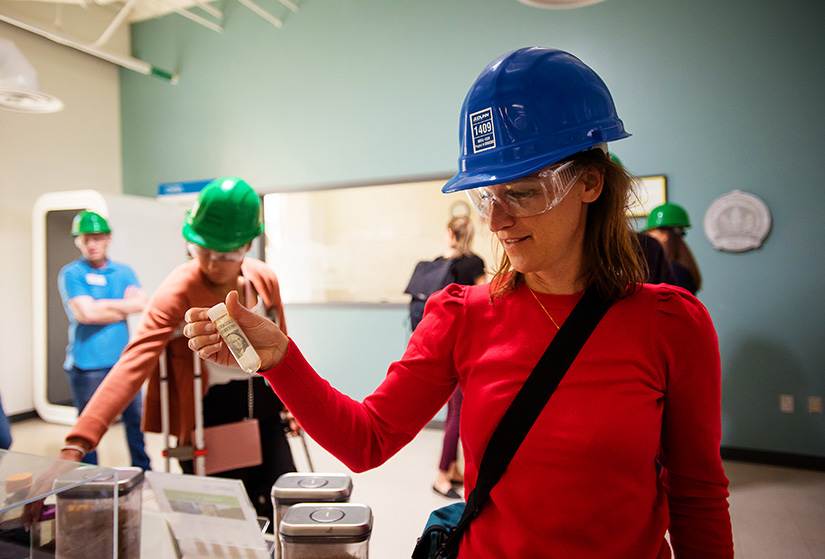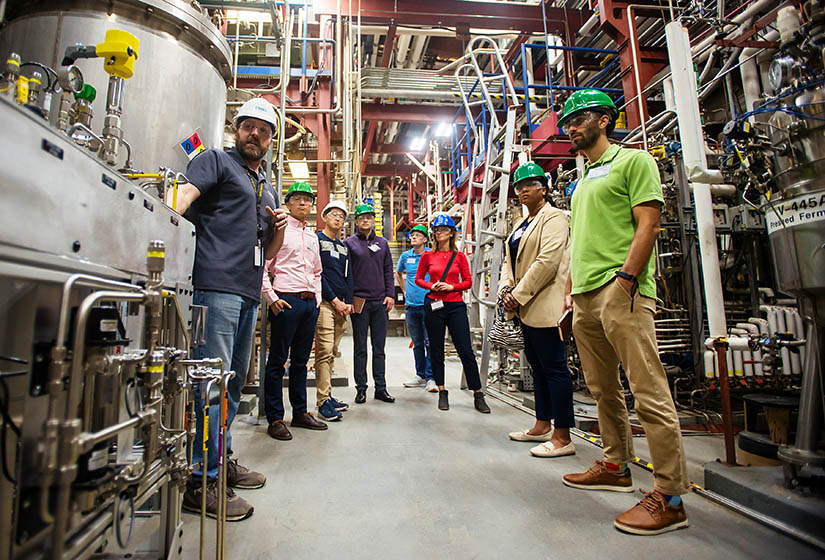West Gate Cohort 2 Entrepreneurs Aim To Raise the Bar
During their spring visit to the National Renewable Energy Laboratory (NREL), Lisa Morey, Yaman Peksenar, and Pilanda Watkins-Curry ended up spending lots of time together as finalists for NREL’s Lab-Embedded Entrepreneurship Program’s (LEEP’s) second cohort. None of the three realized they would be the ones selected to participate in the program.

“We organically all connected during that finalist event,” said Watkins-Curry, co-founder and chief technology officer of Olokun Minerals. “They were the ones I spoke to the most. When we found out we were the selected innovators, we were all like: ‘Oh, wow.’”
West Gate is one of four LEEP nodes within the U.S. Department of Energy's (DOE’s) Office of Energy Efficiency and Renewable Energy (EERE), with core support from the EERE Advanced Materials and Manufacturing Technologies Office. As a LEEP node, West Gate embeds innovators at NREL and pairs them with national laboratory scientists and capabilities over a period of two years. During this time, innovators have prime access to world-class national laboratory facilities and expertise to significantly advance the development of their clean-energy technologies.
For its second cohort, West Gate chose three innovators working to make major changes in several industries to help the world transition to clean energy.
Pilanda Watkins-Curry, Olokun Minerals
As the co-founder and chief technology officer of Olokun Minerals, Watkins-Curry works with salty wastewater streams, or brine waste, to prevent users from dumping the waste back into the environment.
“It can have a huge impact,” she said. “In brine waste, there are many materials, like lithium, sodium, potassium, and others. So, we’re solving two problems: preventing this wastewater from being discharged into the ocean, landfill, or injection well and then taking these minerals out of the water through a liquid separating technique so companies can then use these minerals in renewable technologies.”
Olokun Minerals employs a sustainable process to extract these minerals and can recover multiple minerals at one time. It uses chromatography in a novel way to separate the minerals, then passes them through another phase that allows Olokun Minerals to purify and concentrate the extractions.
By the end of her two years with LEEP, Watkins-Curry hopes Olokun Minerals will develop a pilot program, starting with a focus on lithium for battery materials. She also aims to follow in the footsteps of the successful first West Gate cohort. In less than a year, those four innovators have won multiple awards and raised more than $6.5 million in follow-on funding.
“We’re really looking forward to setting the bar even higher in the next cohort,” Watkins-Curry said.
She has already set a new bar in one way: Watkins-Curry is one of the first two women to participate in West Gate, and she is the first from a racial minority group. Overall, West Gate applications were more diverse for the second cohort. The 11 finalists included four women, and 50% of the finalists were members of minority groups.
“It’s exciting,” Watkins-Curry said. “We need to continue to identify areas for diversity, equity, and inclusion in these types of spaces because they are very new. It’s nice to be one of the first and continue to create a path for people who look like me to come behind me.”

Lisa Morey, Colorado Earth LLC
The other woman in the cohort is also familiar with the need for diversity in this space. Lisa Morey, owner and operator of Colorado Earth LLC, said she was the only female in her graduating class when she attained her degree in construction engineering and management.
“It’s about everyone having a voice,” Morey said. “I’m happy to be a torchbearer as women continue to be thoughtful voices in science and the built environment.”
Morey is working on a nature-based solution for the building envelope. Her approach integrates an ancient building material with newly developed phase-change materials. The work is based on the need to diversify the use of cement-based products and develop another approach toward energy-efficient buildings. Morey’s company produces structural masonry blocks made of a quarry overburden product composed of sand, clay, and a small percentage of lime. Because they are unfired, they have a low carbon footprint, unlike traditional concrete blocks. The phase-change material is a clay-salt sludge that stores and releases large amounts of energy as the material changes phase from solid to liquid and vice versa.
“Cement is one of our main contributors to greenhouse gasses,” Morey said. “The blocks I make are zero cement.”
During her work in West Gate, Morey wants to determine in which climates her blocks and phase-change material will perform the best. Each climate zone may require a unique approach, so she wants to determine necessary customizations.
Because Morey already lived in Golden, Colorado, she had a previous relationship with NREL and hopes to connect with the NREL campus in Alaska to gather cold weather data for her blocks.
“West Gate was appealing because it partnered me with the science-based community here to understand the effectiveness of thermal mass and phase-change materials,” she said. “I want to disrupt the mindset that focuses solely on high insulation (or high R-value) materials.”
Morey’s products are already used in some installations, but she wants to grow, and she knows not to take the opportunity for granted.
“Having gone through the competitive process and meeting the 10 finalists, I am aware of the caliber of my competitors in that stage,” she said. “I know I’ll learn so much in these next couple of years. It’s an exciting venture.”

Yaman Peksenar, Sustainable Chemicals
Yaman Peksenar, senior chemist for Sustainable Chemicals, said a main reason he joined the LEEP is because he has no formal education in entrepreneurship.
“I have some soft skills,” he said. “But West Gate will help me with that side of things.”
Sustainable Chemicals makes a biopolymer that can replace petrochemical plastics. The source material is also sustainable, and Peksenar said Sustainable Chemicals designed the chemistry with its end of life in mind, so the material is chemically recyclable.
“We’ve created the polymer, and now we’re trying to scale it up,” he said. “Based off the trends we’re seeing, we’re very optimistic that the material will have properties like polyethylene. But we haven’t yet optimized the material.”
Additionally, industrial and consumer sentiment toward sustainable materials is growing, leading to legislative changes. Sustainable Chemicals is poised to capture the projected growth in the sustainable polymer market.
He said he feels honored to be part of the West Gate’s second cohort, and he is looking forward to focusing on building his product and his company.
“The first cohort really hit it out of the park after only a year,” Peksenar said. “The chance to connect with those people and work with them, and then pass that back to Cohort 3, it’s wonderful. Being a part of Cohort 2 is exciting because we can still provide feedback so West Gate can better help scientists and entrepreneurs leave a bigger impact.”
There are only a handful of LEEPs around the country, so it is a unique experience. Peksenar believes the progress he can make in the next two years will launch the company forward.
“The end goal is to grow Sustainable Chemicals into a much larger company than two people," he said, "and slowly replace the plastic that is unfortunately suffocating our planet."
Learn more about the West Gate program and the LEEP presence nationwide.

